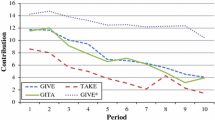Abstract
This paper reinterprets the evidence on lying or deception presented in Gneezy (Am. Econ. Rev. 95(1):384–394, 2005). We show that Gneezy’s data are consistent with the simple hypothesis that people are one of two kinds: either a person will never lie, or a person will lie whenever she prefers the outcome obtained by lying over the outcome obtained by telling the truth. This implies that so long as lying induces a preferred outcome over truth-telling, a person’s decision of whether to lie may be completely insensitive to other changes in the induced outcomes, such as exactly how much she monetarily gains relative to how much she hurts an anonymous partner. We run new but broadly similar experiments to those of Gneezy in order to test this hypothesis. While we also confirm that there is an aversion to lying in our subject population, our data cannot reject the simple hypothesis described above either.
Similar content being viewed by others
References
Andreoni, J., & Miller, J. (2002). Giving according to GARP: an experimental test of the consistency of preferences for altruism. Econometrica, 70(2), 737–753.
Brandts, J., & Charness, G. (2000). Hot and cold decisions and reciprocity in experiments with sequential games. Experimental Economics, 2(3), 227–238.
Brandts, J., & Charness, G. (2003). Truth or consequences: an experiment. Management Science, 49, 116–130.
Charness, G., & Dufwenberg, M. (2005). Deception: the role of guilt. Mimeo. UC Santa Barbara and University of Arizona.
Charness, G., & Dufwenberg, M. (2006). Promises and partnership. Econometrica, 74(6), 1579–1601.
Charness, G., & Dufwenberg, M. (2007). Broken promises: an experiment. Mimeo. UC Santa Barbara and University of Arizona.
Crawford, V., & Sobel, J. (1982). Strategic information transmission. Econometrica, 50(6), 1431–1451.
Ederer, F., & Fehr, E. (2008). Deception and incentives – how Dishonesty undermines effort provision. Mimeo. MIT and University of Zurich.
Fehr, E., & Schmidt, K. M. (1999). A Theory of fairness, competition, and cooperation. The Quarterly Journal of Economics, 114(3), 817–868.
Gächter, S., & Renner, E. (2006). The effects of (incentivized) belief elicitation in public good experiments. Discussion Papers 2006-16. The Centre for Decision Research and Experimental Economics, School of Economics, University of Nottingham, September 2006.
Gneezy, U. (2005). Deception: the role of consequences. American Economic Review, 95(1), 384–394.
Rode, J. (2006). Truth and trust in communication: an experimental study of behavior under asymmetric information. Mimeo. Universitat Pompeu Fabra.
Sánchez-Pagés, S., & Vorsatz, M. (2007). An experimental study of truth-telling in a sender-receiver game. Games and Economic Behavior, 61(1), 86–112.
Selten, R. (1967). Die Strategiemethode zur Erforschung des eingeschränkt rationalen Verhaltens im Rahmen eines Oligopolexperiments. In H. Sauermann (Ed.), Beiträge zur experimentellen Wirtschaftsforschung. Tubingen: J.C.B. Mohr.
Sen, A. (1997). Maximization and the act of choice. Econometrica, 65(4), 745–780.
Sutter, M. (2007, forthcoming). Deception through telling the truth?! Experimental evidence from individuals and teams. Economic Journal.
Vanberg, C. (2008, forthcoming). Why do people keep their promises? An experimental test of two explanations. Econometrica. http://www.econometricsociety.org/asp/pdfstreamer.asp?ref=298.
Wang, J. T. Y., Spezio, M., & Camerer, C. F. (2008). Pinocchio’s pupil: using eyetracking and pupil dilation to understand truth-telling and deception in sender-receiver games. Mimeo. National Taiwan University and Caltech.
Author information
Authors and Affiliations
Corresponding author
Electronic Supplementary Material
Rights and permissions
About this article
Cite this article
Hurkens, S., Kartik, N. Would I lie to you? On social preferences and lying aversion. Exp Econ 12, 180–192 (2009). https://doi.org/10.1007/s10683-008-9208-2
Received:
Revised:
Accepted:
Published:
Issue Date:
DOI: https://doi.org/10.1007/s10683-008-9208-2




